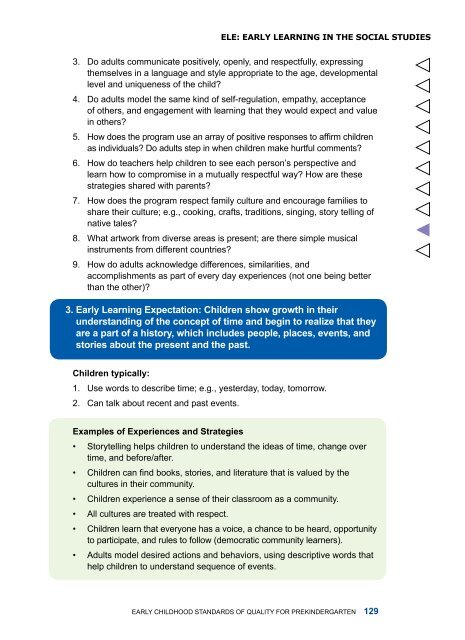Early Childhood Standards of Quality for ... - State of Michigan
Early Childhood Standards of Quality for ... - State of Michigan
Early Childhood Standards of Quality for ... - State of Michigan
You also want an ePaper? Increase the reach of your titles
YUMPU automatically turns print PDFs into web optimized ePapers that Google loves.
ELE: EARLY LEARNING IN THE SOCIAL STUDIES3. Do adults communicate positively, openly, and respectfully, expressingthemselves in a language and style appropriate to the age, developmentallevel and uniqueness <strong>of</strong> the child?4. Do adults model the same kind <strong>of</strong> self-regulation, empathy, acceptance<strong>of</strong> others, and engagement with learning that they would expect and valuein others?5. How does the program use an array <strong>of</strong> positive responses to affirm childrenas individuals? Do adults step in when children make hurtful comments?6. How do teachers help children to see each person’s perspective andlearn how to compromise in a mutually respectful way? How are thesestrategies shared with parents?7. How does the program respect family culture and encourage families toshare their culture; e.g., cooking, crafts, traditions, singing, story telling <strong>of</strong>native tales?8. What artwork from diverse areas is present; are there simple musicalinstruments from different countries?9. How do adults acknowledge differences, similarities, andaccomplishments as part <strong>of</strong> every day experiences (not one being betterthan the other)?3. <strong>Early</strong> Learning Expectation: Children show growth in theirunderstanding <strong>of</strong> the concept <strong>of</strong> time and begin to realize that theyare a part <strong>of</strong> a history, which includes people, places, events, andstories about the present and the past.Children typically:1. Use words to describe time; e.g., yesterday, today, tomorrow.2. Can talk about recent and past events.Examples <strong>of</strong> Experiences and Strategies• Storytelling helps children to understand the ideas <strong>of</strong> time, change overtime, and be<strong>for</strong>e/after.• Children can find books, stories, and literature that is valued by thecultures in their community.• Children experience a sense <strong>of</strong> their classroom as a community.• All cultures are treated with respect.• Children learn that everyone has a voice, a chance to be heard, opportunityto participate, and rules to follow (democratic community learners).• Adults model desired actions and behaviors, using descriptive words thathelp children to understand sequence <strong>of</strong> events.<strong>Early</strong> <strong>Childhood</strong> <strong>Standards</strong> <strong>of</strong> <strong>Quality</strong> <strong>for</strong> Prekindergarten 129


